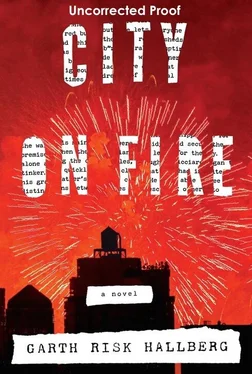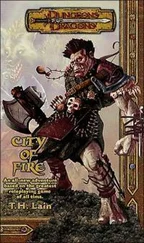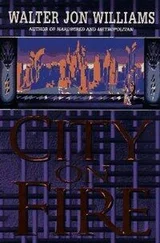“Jesus God, William, what happened to you?”
“It’s nothing.” His voice came from high up in his chest, a place Mercer hadn’t even known existed. He looked away as Mercer examined him up close.
“God! That’s not nothing!”
“Don’t be dramatic. It’s just a sprain. It’ll heal.”
Mercer was already rifling through his shaving kit for the mercurochrome, which Mama used to swear by when C.L. came in looking like this. Wages of sin. He made William sit on the futon and cocked the swivel-necked lamp. He raised his face to the light and brushed the tangled hair back with a thumb. There was another cut on the forehead, and a fist-sized bruise to match the arm. “I don’t suppose you’ll tell me what happened.”
William was pale. Shaking a little. “Please, Mercer. I just fell down some stairs.”
More likely, he’d been jumped for his wallet. William liked to tease Mercer about his “fear of the black man,” but the one time Mercer had allowed himself to be dragged north of 110th Street — ribs at Sylvia’s, followed by Patti LaBelle at the Apollo — the poverty had made their current living situation seem positively deluxe. Sere-looking vagrants scratching themselves in doorways, eyeing him like some kind of Benedict Arnold.… He dabbed gently at the cut with the mercurochrome. William sucked in his breath. “Ow!”
“You deserve it, love, scaring me to death like that. Now hold still.”
THAT NIGHT,and indeed that entire last week of 1976, William would refuse to go see a doctor. Typical, Mercer thought. Secretly, though, he had always admired his lover’s independence: the grin he kept up even in the midst of the most heated dinner-table arguments with friends, and the Morse code his hand seemed to press into Mercer’s thigh beneath the tablecloth’s white hem, the air of secret exemption. Living with him was like getting to see the side of the moon that usually hid its face from us. And as he tended to William’s injuries — black eye, sore jaw, a sprain self-diagnosed as “mild”—Mercer again began to feel that, if he did everything right, William might eventually come to depend on him. He moved the TV to the sleeping nook. He cooked elaborate meals, keeping mum whenever William filled up on candy bars instead. Against his every inclination, he didn’t press William any further on what had happened. And when, on New Year’s Eve, William finally said he was starting to go stir-crazy, he had to go put in a couple of hours at the studio, Mercer swallowed his objections and shooed him out the door.
As soon as he was alone, Mercer cleared as much of the fold-down counter as was possible and got out the little sawed-off ironing board. From the wardrobe rack by the door, he retrieved William’s tuxedo and his own good suit, the one he’d come to the city with and now realized made him look like an insurance salesman. He’d made dinner reservations for nine o’clock at the little deconstructionist bistro downtown William had liked so much last summer. And maybe they could go out afterward, just the two of them. It was true that it had been a long time since they’d been dancing. He methodically attacked wrinkles and then laid the jackets out on the coverlet. They looked like paperdolls, William’s white tuxedo jacket, his own tame brown suitcoat, just barely touching at the ends of the sleeves where the hands would have been. But when the phone rang, he knew even before picking it up who it would be. “Where are you?” he couldn’t help asking. “It’s almost eight.”
Change of plans, William said. Had he mentioned he’d run into an old acquaintance, who told him Nicky and the others were premiering their new project tonight? It behooved him, he’d decided, to verify with his own eyes that it was a total disaster. “You should come. It’ll be like watching the Hindenburg.” There were voices behind him.
“You sound like you’re with people already.”
“I’m at a payphone, Mercer. A Chinese woman is trying to sell me cigarettes off a panel truck.” There was a muffled sound, and he could in fact hear William, at some distance from the mouthpiece, saying, No. No, thank you. “But yes, I thought we could meet up with people at the venue. You won’t have to pay. Bullet will be working the door.”
“Bullet scares me, William.”
“I can’t not be there. I need to see with my own eyes the extent of the travesty.”
“I know, but I thought with your arm still healing …”
“It’s punk rock, Merce. Come as you are.”
There was a spike in background noise. A television or radio seemed to be shilling something, but exactly what got lost in the miles of wire. Distance seeing. Distance hearing. Someone near enough to drown out even the ads laughed or coughed. For the first time he would consciously admit, it occurred to Mercer to wonder if William might be cheating on him. “You know what? I’m feeling a little under the weather.”
“What are you talking about?”
“Kind of achy. Fluey.” It was too much detail; the secret to lying, he’d learned, was not to appear too eager to persuade. But he wanted William to detect the fib, to come home and confront him. The second that elapsed here was enough for Mercer to know he wouldn’t. His voice grew honestly hoarse. “Don’t you at least want to change clothes?”
“Why don’t you come out, honey? Cut loose a little.”
“I told you, I don’t feel good. I’ve got to lie down.”
The silence that followed was audible; the wire took it and twisted it into a sound, a faint, cottony buzz. “Well, don’t wait up. We’ll probably be out late.”
“Who’s we?”
“Be good to yourself, Merce. Drink fluids. I’ll see you next year.” And in another eruption of noise — laughter, almost certainly — the call ended, leaving only a dialtone.
Mercer returned to the sleeping nook with its matched jackets. He had wanted it to strike William as a kind of blissful bower; now that future had been ripped away, and all he could see when he put on his glasses was how young the mirror on the wall made him look. Not sexily, androgynously young, in the style of the age, so much as, frankly, naïve. His soft belly, the dark skin stark against his briefs’ white elastic. He’d assumed that the discomfort he sometimes felt about going out in public with William had to do with shame about … well, about the way they were. But he wondered now if it wasn’t rather that he was afraid it was only this, the blackness, that William saw when he looked at him. Of people thinking he was some kind of trophy. The best times had been right here in this apartment, where they performed for no one but each other: dreams recounted, games of Scrabble played, sporting events enjoyed (William) or tolerated (Mercer). Behind him in the mirror lay the parched Christmas tree. And on the radiator, that goddamned envelope.
He hadn’t touched it since Christmas, but now he picked it up: creamy, densely grained, redolent (amid the kitty-litter funk of the loft) of some substance so precious it only existed in books — myrrh, maybe, or mandrake root. The iron was still hot enough to steam it open. The card was, as he’d suspected, an invitation. The richly escutcheoned Goulds, William had said of his stepmother and — uncle, the one time he’d ever spoken of him, the week Mercer had discovered he was indeed the Hamilton-Sweeney heir, albeit disowned. A golf club rampant on a field azure. He copied down the address, sealed it back up. On the wire-spool coffeetable, William had left out a bottle of rye, which for Mercer had always had literary connotations, Robert Burns by way of Salinger connotations. He took an exploratory nip, and then another. He was unable to report any of the rumored sensations of suavity and sophistication. Gradually, though, a garment of grim resolve slipped down over him.
Читать дальше












